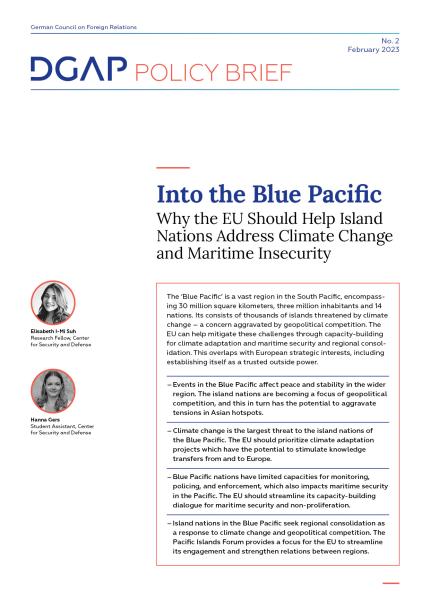|
Events in the Blue Pacific affect peace and stability in the wider region. The island nations are becoming a focus of geopolitical competition, and this in turn has the potential to aggravate tensions in Asian hotspots. |
|
Climate change is the largest threat to the island nations of the Blue Pacific. The EU should prioritize climate adaptation projects which have the potential to stimulate knowledge transfers from and to Europe. |
|
Blue Pacific nations have limited capacities for monitoring, policing, and enforcement, which also impacts maritime security in the Pacific. The EU should streamline its capacity-building dialogue for maritime security and non-proliferation. |
| Island nations in the Blue Pacific seek regional consolidation as a response to climate change and geopolitical competition. The Pacific Islands Forum provides a focus for the EU to streamline its engagement and strengthen relations between regions. |
Please note this article doesn't contain footnotes. To see them please download the pdf file here.
A Region in Turmoil
The label ‘Blue Pacific’ refers to a group of island nations in the South Pacific which encompasses a large maritime area located within the wider triangle between China, Australia, and the United States. Washington and Beijing are vying for influence in the Blue Pacific, and for good reasons: The region is strategically located and owns large deposits of natural resources. Also, there is the perception that its island nations can be influenced for geopolitical purposes.
The United States maintains military bases on Guam, which is a US territory, and on the US state of Hawaii. It has also announced plans to install a further base in the Federated States of Micronesia and an over-the-horizon radar in Palau. It also needs to renew territorial association agreements with three island nations as well as follow up on new arrangements, including the Partners of the Blue Pacific initiative. Over the course of 2022, the United States launched a suite of high-level meetings, new partnerships, and investments plans in direct reaction to Beijing’s increasing economic and political footprint in the region. Washington fears that China could gradually build a military presence in the region, and Beijing’s security deal with the Solomon Islands in April 2022 fuelled such fears. Vessels for trade, economic and military replenishment are routed through the Blue Pacific, and US vessels would also need to pass through the region if there was a contingency in the Western Pacific, for instance in the Taiwan Strait.
At the same time, large powers are scrambling for the region’s resources: The Blue Pacific islands span massive Exclusive Economic Zones (EEZs) which contain extensive stocks of natural resources from fish to nickel, copper, and cobalt. Economic investments also buy political support: Of the six island nations that originally had diplomatic relations with Taiwan, only four remain. The Solomon Islands and Kiribati switched from Taiwan to China in 2019.
What About Europe?
At least on paper, the EU claims a stake of its own in the Blue Pacific. Brussels has formulated a strategy for the Indo-Pacific that explicitly mentions the importance of France’s overseas territories – the seven million square kilometres of French EEZs that lie in the Blue Pacific. The EU and individual European states have diplomatic representations and economic and political interests in the region; EU economic aid and trade relations are important for Pacific Island States (PICs).
The Blue Pacific is also key to the stability of a far broader geography. Instability in this maritime theatre would impact trade routes, supply chains, and thus European economic prosperity. Diverse ripple effects could reach the shores of East Asia, Southeast Asia, Australia, and New Zealand. Military skirmishes in the Blue Pacific could affect French territories in the region and therefore require an EU response.
Moreover, European governments are implicated in the problems facing the PICs. Europe’s historic responsibility for colonialism and other acts of exploitation is frequently cited in political wrangles and fuel calls for independence in the French overseas territories. Historical issues also color the sense of climate injustice, given that PICs are disproportionately affected by climate change while contributing less than 0.03 percent of global greenhouse gas emissions. Finally, there are demands to support and compensate the victims of French nuclear testing activities in the region. Given bilateral post-colonial intricacies, the EU is better suited than individual members to engage the Blue Pacific region.
Putting the Blue Pacific on the Map
There is also a positive reason for Europe to put the Blue Pacific more firmly on the map: Engagement there means playing to the EU’s strengths. The EU has always promoted the notion that nations should be able to exercise consensual political choices over their shared geography. The term ‘Blue Pacific’ is a sympathetic example that follows the EU’s creative interpretation of geopolitics: a local self-description that emphasizes the region’s connectivity, common challenges, and collective interests.
The label ‘Blue Pacific’ stands for community among rich diversity. It describes a huge realm of 30 million square kilometers, thousands of small islands, three million inhabitants in 14 nations with distinct cultures, multiple languages, and policy approaches – all connected by the ocean. The region, moreover, already has a common institution, the Pacific Islands Forum (PIF), which has identified cooperation as the only way to deal with the ravages of climate change and geopolitical competition. All island nations in the Blue Pacific face one overriding issue of global proportions: climate change. It is the ocean that links and sustains them, and it is the ocean that represents a collective, existential threat to them. Their low-lying atolls are disproportionately affected. Warming waters and natural disasters threaten ecosystems, biodiversity, livelihoods, food and water security as well as economic well-being and health in the Blue Pacific; and often impact women disproportionately. As a consequence, climate change and its effects represent the most important security threat and threat multiplier to Blue Pacific nations.
A second major concern that affects the entire Blue Pacific, not least because it prevents its nations from tackling the first, is geopolitical competition. Particularly Australia and the United States court PICs with economic and political arrangements to buy influence and support against China, which responds in kind. As Blue Pacific nations fear to become – as during the 20th century – subject to coercion and exploitation in the context of strategic rivalries, the Permanent Representative of Fiji to the United Nations in New York expressed the local consensus that “in the geopolitical contest between the United States and China, climate change is winning.”
The priority given by the region to mitigating climate change and geopolitical rivalry overlaps with European interests in the Blue Pacific. But the EU has yet to capitalize on its capacity-building efforts.
Climate Security
Blue Pacific leaders declared a “Climate Emergency” in July 2022 and called for support for the region’s efforts in adaptation, mitigation, and disaster risk reduction. Such support should include a change of perspective, with the PICs seen not as mere victims, but as sources of knowledge and places to do research. In fact, the Blue Pacific has been described as an innovation hub and has put forward several innovative adaptation projects. However, the region in many cases lacks the financial, technical, and human capacities needed for implementation.
To address some of these shortfalls, the EU launched the EU-Pacific Green-Blue Alliance in November 2021. This partnership includes a financial package of €197 million for the years 2021-2027. It also provides funds for other major climate adaptation projects. Technical assistance and close cooperation with local communities, such as through roundtable discussions and joint research projects, help to reduce barriers and facilitate the inclusion of women and Pacific indigenous knowledge. By securing local ownership and bringing in diverse constituencies, the sustainability of climate security projects is increased. Such an approach improves the chances for innovation which can also feed European climate security efforts elsewhere.
Yet, the EU is not as effective in its efforts to support climate adaptation as it would like to believe. Its bureaucratic structures mean that access to funding and the implementation of projects are often difficult.
Maritime Security
As stated in its Indo-Pacific strategy, the EU is committed to improving maritime security in the region. This includes strengthening capacities against drug and human trafficking, wildlife crime, illicit goods, and financial flows linked to terrorism. The EU also seeks to consolidate information-sharing mechanisms. But while the information aspect is vital, Pacific island countries particularly struggle with technological tools (software), technical equipment (hardware), and trained personnel for data management, monitoring, and enforcement.
Helping to build up such capacities would also align with the EU’s long-standing goal of stopping the proliferation of weapons of mass destruction. Capacities for non-proliferation and sanctions enforcement overlap with capacities needed for maritime security on the practical level; both sets of capacities evolve around information gathering, monitoring, and enforcement. North Korea’s illicit activities show the practical importance of such efforts: Pyongyang is well-known to sail under false flags and off the radar in order to circumvent arms embargos and sanctions. And North Korea exploits the lack of capacities among PICs for its false flag operations.
As part of its longer-standing non-proliferation strategy, the EU already has set up an annual dialogue on capacity-building for non-proliferation and sanctions enforcement in the Indo-Pacific. Brussels could become more effective by merging its efforts for maritime security with those for non-proliferation and upgrading its dialogue with the Pacific Islands Forum. Such capacity-building would serve to meet Brussels’ interests and address vulnerabilities in the Blue Pacific as well as some island nations’ interest in security cooperation. The Solomon Islands’ security pact with “China, that included arrangements for training local security forces, exemplifies” such local demands.
Foster Regional Cooperation
Faced with climate change and an array of political challenges, Blue Pacific nations seek regional consolidation. For the EU, it is part of its DNA to seek to strengthen regional organizations. Upgrading EU-PIF relations would be a natural next step for both sides.
The EU has traditionally followed a dual approach of engaging PICs both multilaterally and bilaterally. Yet, the PIF is developing into the key regional organization for matters of security and issues common to all the island nations. The EU already cooperates with the PIF as a dialogue partner, and it can use its status as a regional body to participate in ministerial and working-level meetings. Moreover, an EU-PIF partnership framework would institutionalize region-to-region relations, which would boost regional consolidation and facilitate the EU’s capacity-building activities in the Blue Pacific.




